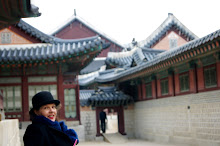Back when I used to teach high-school history, another history teacher, Chris, left mid-year and I took over her senior classes because they couldn't find a suitable replacement. It wasn't a perfect fit because Chris was a Material Culture Historian trained as a museum curator whereas, as you know, I'm a Social Historian, which means I look for history in narrative - teasing out the threads of world-view from the stories a culture tells themselves - and really didn't know what someone with training like Chris teaches.
However, normally whenever I've taken over someone else's classes, I've looked through their planning and thought "Oh Lordy, what a moron!" because the work set is usually so puerile and shallow ... but not so with Chris. Her work was entirely delicious and I felt the urge to cry out "I am not worthy! I am not worthy!"
And best of all that work was the first assignment the Year 12 kids were to be given: this wonderfully messy research project called "Who were the Spartans?" wherein Chris's huge boxes of data on the material culture of the Spartans AND all the surrounding civilisations were distributed to help the class decide.
As you know, Spartans were not Greek. They were an unknown and landless people who arrived in Greece looking for a homeland and were given some unused Greek Peninsula in exchange for the promise of help in all future Greek battles ... so because they were unknown Chris wanted this class to decide where they'd originally come from.
Interesting, right? And, oh boy, it was fun. It was all new to me too so I was in there with the kids, sitting on the floor and rummaging around, discussing and arguing every point of culture and the three months it took us to work our way through those boxes was sheer joy, and today there's probably very little I don't know about the Spartan "Papa Culture" and "Mama Culture", and I could go on forever about how it was very clear that they were very much like the Straits Chinese of the Singapore region: an unsuccessful 'marriage' of two entirely different peoples with completely different cultures, beliefs, values, ways of doing everything and entirely different world views, who had surmounted the problem by giving up all attempts to blend and simply assigning girls to one culture and boys to another and for the most part living two entirely separate lives.
And this was the Spartan way too: a Patriarchal Tribe and a Matriarchal Tribe who found their way forward by not trying to blend in with each other ...
But to cut to the chase, from going through all aspects of the two Spartan material cultures and those of all the surrounding civilisations, I am convinced that the Spartan "Mama Culture" was the remnant population of Amazon women (there is too much proof that they existed for any valid suggestion these women were simply mythic) from up there near the Black Sea ... and I'll pretty much put money on the Spartan men being Scythian, another people also from up near the Black Sea.
And wouldn't you give anything to find out their story?
However, there was one little niggle in all this surety: Korea! There were simply too many meshes between the Spartan Papa Culture and aspects of the Korean culture - stuff like courtyard houses, tumult burial mounds and votive offerings - and ... well, that was something I've always wanted to check out.
Therefore high on my list of what to do in Korea was checking out the Korean Emperors tumult burial mounds because Scythians too built tumult burial mounds for their leaders.
I should throw in the photos here, but instead I'll do a separate post with photos later so you can check it out for yourself. But in the meantime I can tell you that the park containing the Josean Emperors' burial mounds is highly efficient and organised and even before you get to wander around the tumults, there's this gorgeous little Korean-style house where they show films on how these burial mounds were built thus even before we got into the park, I knew that the Koreans and Scythians built their tumults in an entirely different way and thus the fact they both did so was simply a co-incidence.
Thus too is the fact that both cultures did votive offerings in water ... although I think I've decided that Koreans didn't do votive offerings and that this is all a simple misreading of Korean archeological discoveries, but I'll do another post on that as well.
So our visit to Seoul was deeply rewarding in this regard and I now can say with 100% certainty that the Spartans were NOT Korean.
Subscribe to:
Post Comments (Atom)






1 comment:
Or maybe they just borrowed it, but without mixing overmuch the two different racial groups. The model here would be the American Southwest with the heavy Spanish/Mexican cultural influences in food, housing, words, equipment etc. layered over the Cowboy/English Borderer Cattle Herding (Celtish?)dominate culture.
(You really lived in the industrial part of Suva? So much for your mother's real estate acumen.
(Unless of course it was part of a larger scheme to force you to go to University....)
Just a thought.
VicB3
Post a Comment